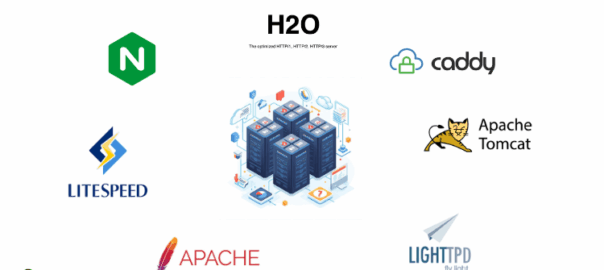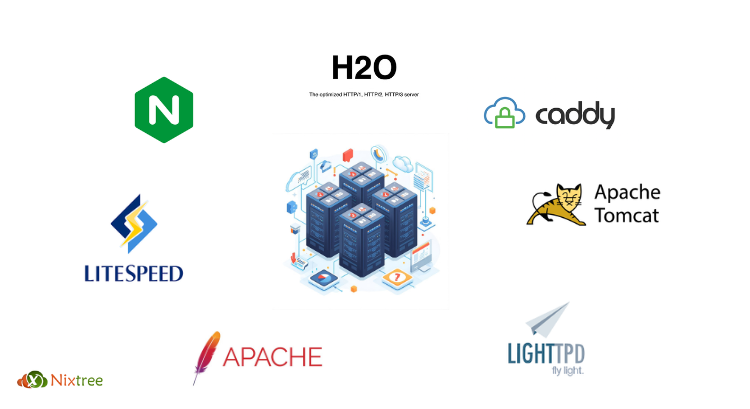The Best Web Servers You Should Know
The Best Web Servers You Should Know
Behind every fast-loading website, real-time app, or scalable API, there is a powerful web server handling the heavy lifting. Whether building a cloud-native SaaS, hosting dynamic content, or deploying micro-services, your choice of server is critical for performance.
Here’s a breakdown of the most capable, developer-loved web servers powering today’s modern web, each excelling in its own domain.
1. Apache HTTP Server
Apache has stood the test of time for a reason. It’s modular, cross-platform, and compatible with a wide range of technologies like PHP, Python, and Perl.
Why it stands out:
- Highly customizable via modules
- Very good at running multiple websites on a single machine.
- Works as both a web server and a backup server.
- Provides tools for safe and secure web communication.
- Supports additional modules and tools for extra features.
Perfect for:
SaaS platforms, content-heavy sites, or enterprises needing fine-grained server control.
2. Nginx
Need performance without the bloat? Nginx handles massive concurrent connections with minimal memory, making it a favorite in containerized, API-heavy environments.
Why it stands out:
- Manages high traffic with minimal system resources.
- Works as a web server, reverse proxy, and load balancer.
- Delivers static content quickly and efficiently.
- Plays nicely with Kubernetes and Docker.
- Supports TLS/SSL encryption and includes caching features for better speed.
Perfect for:
High-load web apps, real-time APIs, and scalable SaaS solutions.
3. LiteSpeed Web Server
LiteSpeed brings top-tier performance with native HTTP/3 support and aggressive caching. It’s often seen outperforming traditional servers in dynamic content delivery.
Why it stands out:
- Excellent WordPress optimization
- Automatic GZIP compression and caching
- Lightweight yet powerful
Perfect for:
eCommerce sites, CMS-driven platforms, and anyone chasing faster page loads.
eCommerce sites, CMS-driven platforms, and anyone chasing faster page loads.
4. Lighttpd
Lighttpd, also known as ‘Lighty’, is a compact web server that’s ideal for serving static and dynamic content with minimal CPU and RAM usage.
Why it stands out:
- Handles many users at once.
- Works with HTTP proxying, SCGI, and FastCGI.
- Uses very little CPU and memory.
- Offers load balancing, virtual hosting, and custom URL paths.
- Supports SSL/TLS for encrypted and safe browsing.
Perfect for:
Internet of Things apps, embedded systems, or micro-services where resources are limited.
Internet of Things apps, embedded systems, or micro-services where resources are limited.
5. Apache Tomcat
If your app lives in the Java world, Tomcat is a natural fit. It provides robust support for Java Servlets and JSP technologies.
Why it stands out:
- Supports the latest Jakarta EE (formerly Java EE) standards for modern Java applications.
- Trusted by developers worldwide and fully free to use.
- Handles large-scale, mission-critical websites with ease.
- Actively maintained by the Apache Foundation
Perfect for:
Enterprise Java apps, backend platforms, and Spring-based services.
Enterprise Java apps, backend platforms, and Spring-based services.
6. Caddy
Caddy is all about ease of use and automatic HTTPS. With modern protocol support and simple config, it’s a dream for developers who want to deploy and forget.
Why it stands out:
- Built-in HTTPS via Let’s Encrypt
- Minimal setup with Caddyfile
- Supports HTTP/3, TLS, and WebSockets
- Caddy works on all major platforms and needs no additional runtime components.
Perfect for:
APIs, personal projects, and small web apps that need secure deployments—fast.
APIs, personal projects, and small web apps that need secure deployments—fast.
7. H2O
H2O brings blazing speed with full support for HTTP/2 and HTTP/3 (QUIC), server push, and advanced TLS.
Why it stands out:
- Optimized for HTTP/2 and HTTP/3 to deliver content with minimal latency.
- Low CPU and memory usage for high-performance apps.
- Supports FastCGI, reverse proxy, and scriptable workflows.
- Protects your site with modern encryption and automatic certificate updates.
- Server push, content prioritization, and self-upgrade capabilities.
Perfect for:
Next-gen web platforms, micro-services, and apps where every millisecond counts.
Next-gen web platforms, micro-services, and apps where every millisecond counts.
Final Thoughts
Your choice of web server doesn’t just affect performance, it shapes how your application scales, secures data, and serves users. Whether you’re after maximum speed, minimal resource use, or modern protocol support, there’s a perfect fit above.
Pick smart, deploy faster—and let your server do the heavy lifting behind the scene.
No matter which web server powers your stack, Nixtree helps you deploy, optimize, and maintain high-performance infrastructure without the guesswork.
🔥 Take the next step—partner with Nixtree for expert server management, tuning, and scalable solutions built for modern apps.
Facebook Comments


